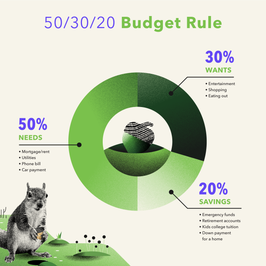9 Tips for Saving Money

Raise your hand if you’d like to save more money. Sixty-five percent of Americans kicked off the year with a financial resolution—and of those, nearly two-thirds said that building a habit of savings was their top strategy, according to a CIT Bank survey.
When establishing any habit, a little bit of intention goes a long way. Read on for some simple ways to start saving money now and make it a reality—not just a resolution.
Cash in on credit card rewards.
If you have the discipline to use them responsibly, cash-back credit cards can unlock a steady stream of free money. The Chase Freedom Unlimited card, for example, lets you earn unlimited 1.5 percent cash back every time you swipe your card. Many rewards cards will throw in sign-up bonuses to boot.
The key is to use them only for essential purchases you were planning on making anyway: think gas, groceries, your phone bill and so on. Just be sure to pay off the balance at the end of every billing cycle. (This last step is critical. Getting slammed with interest negates any cash-back rewards.)
Pick up a side hustle.
Landing a steady side hustle or two could be just the thing to bump up your savings account. The average side gigger earns over $8,000 per year on top of their regular income, according to a 2018 Bankrate survey. It isn’t all that surprising that 37 percent of Americans are cashing in.
If moonlighting as an Uber driver isn’t your thing, don’t be afraid to think outside the box. There are plenty of side hustles out there that require little effort to get off the ground—from completing micro tasks to taking surveys.
Boost your investing game.
If you haven’t already begun investing, the time to get in on the action is always now—thanks to the power of compound interest. Try our compound interest calculator to see for yourself! Mutual funds and exchange-traded funds (ETFs) are your friend here. Look to your 401(k) to get started, especially if your employer offers any sort of match. If that’s not an option, an individual retirement account (IRA) is another great way to grow your wealth over the long term.
Is investing already part of your financial routine? Upping your efforts is one way to save even more for the future. Enter high-dividend stocks. Dividends are payouts some companies dole out to their investors in addition to regular returns. (Think of it as a nice little cherry on top.) Just don’t neglect the rest of your portfolio. Staying diversified with a good mix of different securities is the best way to set yourself up for overall growth.
Bargain down your current bills.
Skim over your budget and zero in on recurring expenses. Those who are willing to put in a little bit of effort may be able to bring down their spending simply by asking. Everything from your internet bill to your cable package to your cell phone plan is pretty much negotiable—opening the door for hundreds of dollars of savings.
Over 80 percent of consumers who asked for a lower credit card APR were able to bring down their interest rate an average of 6 percentage points, according to a 2018 CompareCards.com survey.
Negotiate a pay raise.
While your annual review is the perfect time to make your case for a pay raise, you certainly don’t have to wait for it to roll around. Being proactive and reminding your higher-ups of your successes at work can go a long way in increasing your earnings. When initiating the pay raise conversation, it’s all about proving your worth. Be ready to show your value with concrete examples of ways you’ve helped the company’s bottom line. Average merit pay increases, as they’re called, could give your salary a 4- to 5-percent boost, according to Salary.com.
Review your non-monthly expenses.
Non-monthly expenses are random bills that creep up on you throughout the year. We’re talking insurance premiums, taxes, holiday spending, medical co-pays. If you aren’t prepared, these little expenses can tank your budget.
List out all the non-monthly bills you can think of, using past bank statements to help jog your memory. Add them all up, divide that number by 12, then add the total to your monthly budget. Squirreling away this money as you go should help keep your savings plan intact as you move through the year.
Embrace periodic spending freezes.
Rev up your savings rate by periodically going all in with a no-spend weekend. Meal prepping beforehand, finding free things to do around town, and cashing in any prepaid perks like old gift cards can help take the edge off. The goal is to find ways to spend time, not money.
Just don’t go too hardcore here. Similar to restrictive dieting, frequently depriving ourselves of indulgences actually makes us more likely to cave in and overspend. Translation: Reasonably treating yourself might actually help you save more.
Make a temporary big-ish sacrifice.
This takes periodic spending freezes one step further. Looking to top off your savings account on the quick? Accelerate your efforts by making a big change in the short term. Taking on a temporary roommate, for example, could free up hundreds of dollars per month that you could funnel toward your financial goals.
Other opportunities include swapping your car for public transportation, moving back home with mom and dad, or embracing a vacation-free year. Again, think in terms of quick-hit actions you can adopt for a short period of time to make a big difference in your savings account.
Sell unwanted stuff.
Offloading items you no longer want or need is another way to bring in some extra cash. Furniture, TVs and toy boxes are among the most-searched-for items on Facebook Marketplace, it turns out. KonMari your life and let go of the things that no longer spark joy. Converting your clutter into cash should help soften the blow. Sites like eBay, Gazelle (where you can offload smartphones and other devices) and Poshmark (for selling clothes) are a great jumping-off point. If you’ve got unwanted gift cards to offload, consider GiftCardGranny.com.
Growing your savings account doesn’t have to require a dramatic lifestyle change. Some out-of-the-box thinking and a little bit of discipline is all it takes to get you (and your money) moving in the right direction.
This material has been presented for informational and educational purposes only. The views expressed in the articles above are generalized and may not be appropriate for all investors. The information contained in this article should not be construed as, and may not be used in connection with, an offer to sell, or a solicitation of an offer to buy or hold, an interest in any security or investment product. There is no guarantee that past performance will recur or result in a positive outcome. Carefully consider your financial situation, including investment objective, time horizon, risk tolerance, and fees prior to making any investment decisions. No level of diversification or asset allocation can ensure profits or guarantee against losses. Article contributors are not affiliated with Acorns Advisers, LLC. and do not provide investment advice to Acorns’ clients. Acorns is not engaged in rendering tax, legal or accounting advice. Please consult a qualified professional for this type of service.









